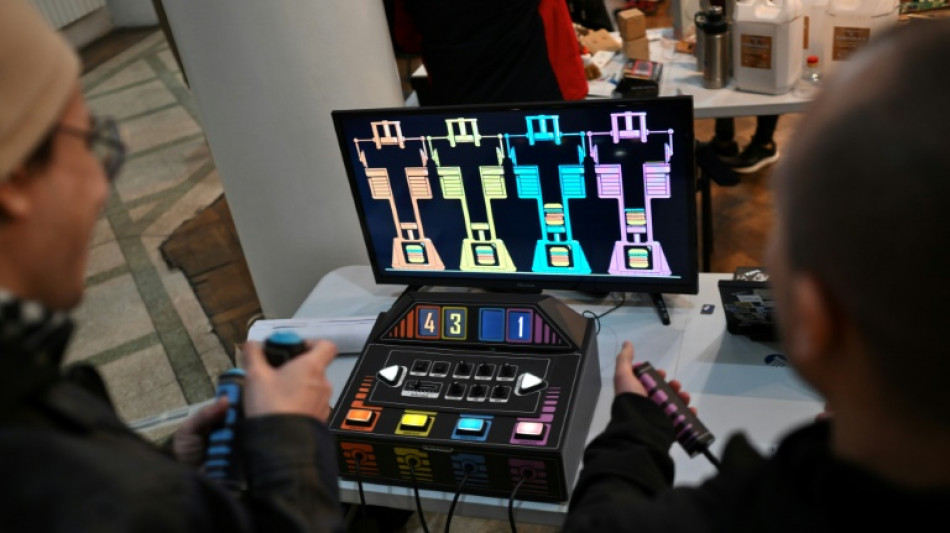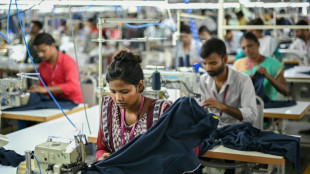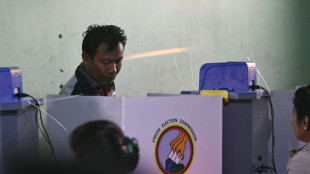
-
 NHL players will compete at Olympics, says international ice hockey chief
NHL players will compete at Olympics, says international ice hockey chief
-
Kohli surpasses Sangakkara as second-highest scorer in international cricket

-
 Young mother seeks five relatives in Venezuela jail
Young mother seeks five relatives in Venezuela jail
-
Arsenal villain Martinelli turns FA Cup hat-trick hero

-
 Syrians in Kurdish area of Aleppo pick up pieces after clashes
Syrians in Kurdish area of Aleppo pick up pieces after clashes
-
Kohli hits 93 as India edge New Zealand in ODI opener

-
 Trump tells Cuba to 'make a deal, before it is too late'
Trump tells Cuba to 'make a deal, before it is too late'
-
Toulon win Munster thriller as Quins progress in Champions Cup

-
 NHL players will complete at Olympics, says international ice hockey chief
NHL players will complete at Olympics, says international ice hockey chief
-
Leeds rally to avoid FA Cup shock at Derby

-
 Rassat sweeps to slalom victory to take World cup lead
Rassat sweeps to slalom victory to take World cup lead
-
Liverpool's Bradley out for the season with 'significant' knee injury

-
 Syria govt forces take control of Aleppo's Kurdish neighbourhoods
Syria govt forces take control of Aleppo's Kurdish neighbourhoods
-
Comeback kid Hurkacz inspires Poland to first United Cup title

-
 Kyiv shivers without heat, but battles on
Kyiv shivers without heat, but battles on
-
Salah and fellow stars aim to deny Morocco as AFCON reaches semi-final stage

-
 Mitchell lifts New Zealand to 300-8 in ODI opener against India
Mitchell lifts New Zealand to 300-8 in ODI opener against India
-
Iran protest death toll rises as alarm grows over crackdown 'massacre'

-
 Malaysia suspends access to Musk's Grok AI: regulator
Malaysia suspends access to Musk's Grok AI: regulator
-
Venezuelans await release of more political prisoners, Maduro 'doing well'

-
 Kunlavut seals Malaysia Open title after injured Shi retires
Kunlavut seals Malaysia Open title after injured Shi retires
-
Medvedev warms up in style for Australian Open with Brisbane win

-
 Bublik powers into top 10 ahead of Australian Open after Hong Kong win
Bublik powers into top 10 ahead of Australian Open after Hong Kong win
-
Sabalenka fires Australian Open warning with Brisbane domination

-
 In Gaza hospital, patients cling to MSF as Israel orders it out
In Gaza hospital, patients cling to MSF as Israel orders it out
-
New protests hit Iran as alarm grows over crackdown 'massacre'

-
 Svitolina powers to Auckland title in Australian Open warm-up
Svitolina powers to Auckland title in Australian Open warm-up
-
Keys draws on happy Adelaide memories before Australian Open defence

-
 Scores of homes razed, one dead in Australian bushfires
Scores of homes razed, one dead in Australian bushfires
-
Ugandan opposition turns national flag into protest symbol

-
 Bears banish Packers, Rams survive Panthers playoff scare
Bears banish Packers, Rams survive Panthers playoff scare
-
'Quad God' Malinin warms up for Olympics with US skating crown

-
 India eyes new markets with US trade deal limbo
India eyes new markets with US trade deal limbo
-
Syria's Kurdish fighters agree to leave Aleppo after deadly clashes

-
 New York's Chrysler Building, an art deco jewel, seeks new owner
New York's Chrysler Building, an art deco jewel, seeks new owner
-
AI toys look for bright side after troubled start

-
 AI pendants back in vogue at tech show after early setback
AI pendants back in vogue at tech show after early setback
-
Grateful Dead co-founder and guitarist Bob Weir dies aged 78

-
 Myanmar votes in second phase of junta-run election
Myanmar votes in second phase of junta-run election
-
'One Battle After Another' heads into Golden Globes as favorite

-
 Rams survive Panthers scare to advance in NFL playoffs
Rams survive Panthers scare to advance in NFL playoffs
-
Rallies across US after woman shot and killed by immigration agent

-
 Egypt dump out holders Ivory Coast as Nigeria set up AFCON semi with Morocco
Egypt dump out holders Ivory Coast as Nigeria set up AFCON semi with Morocco
-
Rosenior salutes 'outstanding' start to Chelsea reign

-
 Maduro loyalists stage modest rally as Venezuelan govt courts US
Maduro loyalists stage modest rally as Venezuelan govt courts US
-
Byrne late penalty fires Leinster into Champions Cup last 16 after 'ding-dong' battle

-
 Rosenior makes flying start as Chelsea rout Charlton in FA Cup
Rosenior makes flying start as Chelsea rout Charlton in FA Cup
-
Rallies across US against shooting of woman by immigration agent

-
 Salah closer to AFCON glory as Egypt dethrone champions Ivory Coast
Salah closer to AFCON glory as Egypt dethrone champions Ivory Coast
-
O'Neil ends 'crazy three days' with Strasbourg cup canter


'Old things work': Argentines giving new life to e-waste
Need a new gaming console? Just make one yourself with an old ventilator. Got an old payment terminal? Turn it into a camera.
These are just some of the creations of Argentina's Cyber Dumpster Divers, a collective of ingenious tech aficionados who turn e-waste into new products.
"We experiment with technology by trying to recycle it and repurpose items that other people would simply throw away," said Esteban Palladino, a musician who goes by the pseudonym Uctumi on social media.
"It's a movement that has a charitable side, a techno-political side, and also a playful side," he added.
Argentina produces an estimated 520,000 tons of electronic waste per year, making it fifth in the Americas after the United States, Brazil, Mexico and Canada, according to a 2024 report by the UN Research Institute.
In 2022, the world generated a record 62 million tons, the report said.
The manifesto of the Cyber Dumpster Divers, who have dozens of members across Argentina, says that faced with "the immorality of equipment thrown in the trash, the... diver rebels against the authority of the market."
The waste pickers see themselves as revolutionaries at war with the tech "oligarchy."
They call their provincial chapters cells, their manifesto is modelled on that of Karl Marx, and their posters feature a cyborg Che Guevara, who was born in Argentina.
The movement began in 2019 with hardware soup kitchens where people exchanged electronics parts.
During the Covid pandemic, it gained impetus because many people suddenly needed computers to study or work at home.
In stepped the recyclers.
They resurrected old machines from the rubbish heap, fitted them with free operating systems and donated them to people and organizations in need.
- 'Old things work' -
The collective's third annual meeting in Buenos Aires included a workshop on reviving defunct smartphones.
Visitors also lined up to play the "Ventilastation," a gaming console made from an industrial fan, and to learn how to run AI applications locally on old computers.
"Old things work," read a slogan on the screen.
Electronics engineer Juan Carrique traveled 470 kilometers (290 miles) from the central province of Santa Fe to present "roboticlaje" or robotic recycling.
Carrique goes into schools to teach children how to use e-waste to build temperature sensors or motor controls.
"It's not the same to buy something ready-made as having to make it yourself, using pieces of trash," he said.
The 47-year-old diabetic is a fierce critic of planned obsolescence -- companies programming products to become out of date after a certain period.
He used a free app to make his blood sugar monitor compatible with his phone, extending the device's manufacturer-specified lifespan.
It's about "reclaiming the right to recognize when things work or don't work, not being told they work or don't work," he said.
While giving a second life to old electronic devices may seem the height of geekiness, the Cyber Dumpster Divers are wary of the impact of smartphones, particularly on Argentina's youth.
"It's this ecosystem that is destroying the social fabric, destroying the psyche of young people," one of the recyclers, Cristian Rojo, said.
F.AbuZaid--SF-PST



